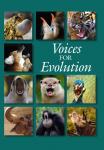
The chorus of support for the teaching of evolution continues, with statements from the Smithsonian National Museum of Natural History, the Saint Louis Science Center, and the Utah Museum of Natural History.
The Smithsonian National Museum of Natural History's statement reads, "Evolutionary theory provides a logical framework for making sense of the great diversity of organisms on earth — for understanding both differences and similarities among them," and adds, "there is no scientific controversy about the fact that evolution occurs." With respect to human evolution, all of the evidence gathered from scientific investigation "supports the idea that humans have emerged by a process of change over time, and that humans are related to all other lifeforms."
In its statement, the Saint Louis Science Center explains, "The Saint Louis Science Center considers science literacy a cornerstone of both personal and national success in the 21st century. Our mission to ignite and sustain lifelong science and technology learning supports this value. ... In keeping with this, the Saint Louis Science Center presents evolution as a central, unifying concept in biology. Our exhibits and programs will reflect new scientific discoveries as they emerge and shape our understanding of biological diversity."
And the Utah Museum of Natural History's statement reads, "we accept the theory of evolution, which the unifying concept of all biological sciences. While there remains ongoing lively debate about the processes of evolutionary change — that is, how evolution occurs — the overwhelming majority of biologists fully endorse the idea that all organisms on earth share a common ancestry and that life's unfolding has encompassed billions of years of time. Like gravity, evolution is one of the cornerstones of modern science, and it represents one of the key themes of our institutional mission."
All three of these statements are now reproduced, by permission, on NCSE's website, and will also be contained in the fourth edition of NCSE's Voices for Evolution.
